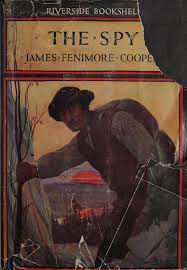The Spy, A Tale of the Neutral Ground
- Bowdoin Plumer
- Feb 25, 2024
- 4 min read
James Fenimore Cooper
1821
Grade: B-

Like the other works from Cooper that I’ve had the pleasure to engage with, here he finds these lovely and powerful moments that seem to elevate the work as a whole. These are seldom sustained and are often confined to the novel’s latter stages, but it is no less true in this instance. A short discussion of a few of these moments here will not go amiss, namely Dunwoodie’s struggle at the end of chapter 8, the reflection and death of Captain Lawton, and the final meeting between Washington and Birch at the novel’s conclusion. The first wonderfully captures the young Major’s bitter withdrawal from the adrenaline of battle, “The heart which has not become callous, soon sickens with the glory that has been purchased with the waste of human life”(109). Despite all of the perhaps antique professions of valor and honor and glory that were typical of descriptions of war at the time, here was at least a moment where the reality of it all sets in, and it is most admirably painted here. The second, the philosophical musings of Captain Lawton on the night before he falls in battle, are equally poignant and painful in their consequence. On the eve of the battle, Lawton reflects, “There is a star…struggling to glitter through a few driving clouds; perhaps that too is a world, and contains its creatures endowed with reason like ourselves; think you that they know of war and bloodshed?”(388). Almost science fiction in its implications, this too is one of those brief moments that Cooper allows his characters to look beyond the notions of their time and setting to the horrific reality they are experiencing. Lastly, Birch’s refusal of payment from General Washington who, like everyone else, fails to properly appreciate the work of the hidden patriot.
These moments are supported by a few extremely well drawn characters that stand out amidst their less admirable compatriots. Harvey and Frances are the most successful of these. Harvey is a complex, heroic, and surprisingly everyman hero in a work that often champions the baseness of the common man. He is strikingly three-dimensional as he suffers through the loss of his father and agonizes over the fact that his true character is unknown to the country he loves. Self sacrifice is seldom so little rewarded in modern heroes. Likewise, Frances Wharton comes across as affectionate, observant, loyal, and determined without losing her foibles and failings which would cast her as unbelievable.
Cons: Some of the biggest detriments to the work are the meandering and sometimes repetitive nature of the plot, supporting characters that are frustratingly one-note, and a weakly defined and underutilized villain.
The first of these could in part be caused by the nature of the genre, but the narrative does not build over time to a proper climax but rather involves a series of incidents of an episodic nature. Captain Wharton’s original capture, escape and recapture, the death of Harvey’s father and burning of his home, the attack on, and burning of, the Locusts, and the trial and escape of Captain Wharton, don’t work together to culminate in the final conversation between Washington and Birch. As this is a defining characteristic of my own work I recognize its presence well.
Furthermore, characters like Sitgreaves can be so focused on a single object that their conversation can border on annoying. The good doctor finds any and every excuse to mention his philosophy of medicine that by the end of the novel one wonders if the character is capable of any other thought. He, along with characters like Katy and Betty are often played for comic effect, but it seldom amounts to more than a mean spirited taunt at the expense of the ignorant.
While the skinners are an ever present threat, they appear at predictably inconvenient moments with caricatured villainy. They are cartoonishly evil, and, with the exception of the suddenly tragic death of their leader, painted with a universal brush. Likewise, their loyalist counterparts only make a single appearance at the close of the novel to announce that both sides are capable of this manner of villainy.
Overall the feelings left upon exiting the novel are good ones, and that is in no small part due to the skill with which Cooper seems to be able to close his works. Like The Last of the Mohicans the author has a supreme talent for wrapping his works in such gravity and solemnity that it’s difficult not to forgive the repeated motifs of escape by disguise, fainting maidens, and haughty language. Harvey Birch is a wonderful character and hero. His willingness to not only go unsung, but reviled by the cause for which he dedicates his life leaves only his reader to honor him. Watching him suffer the loss of his father who alone supported him in his mission is the height of tragedy, and the swell of patriotic feeling (which is certainly part of the goal of the work as a whole) is honest and lingering as the novel closes. A difficult read for the impatient reader, but wholeheartedly endorsed.



Comments